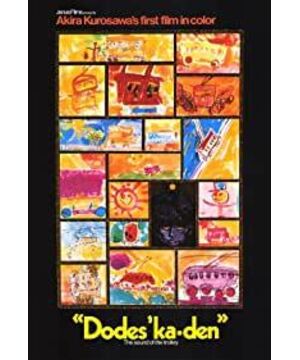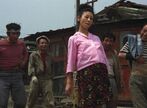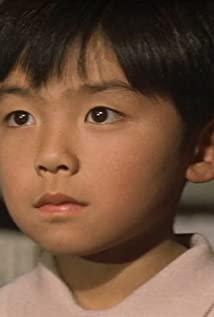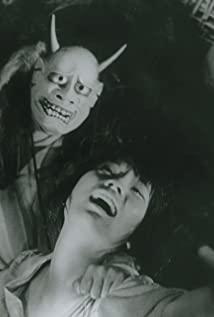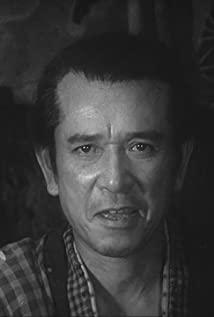In the shell of surrealism is humanitarian pity, Akira Kurosawa's neglected film "A Small Market Without Seasons" This is a city story that takes place on the back of any high-rise building in a developing country; this is true for the general public society, unknowingly or unintentionally by the mainstream media. The title of the film comes from the mantra of the film's protagonist (Dodes' ka-den), a sound that mimics the walking of a tram. In the human world, there is always a little voice to prove your existence. In the rumbling sound of the tram, we saw your smile, the mentally retarded Xiaoliu, peaceful and contented. The trams come and go day after day. In the cycle of time series, every day of the general public is the same, helpless and helpless, at the moment when the individual can't compete with fate. The mental retardation of Xiaoliu is not a kind of happiness. For all living beings in the market, living is sometimes just a breath, and their daily life is heavy and hopeless for their livelihoods and rice bowls. In this regard, the mentally retarded Xiaoliu is not a kind of happiness. In the world of existence, is there still less trouble for people who think because of thinking? Xiaoliu's mother recited the scriptures, and Xiaoliu prayed to the Buddha and prayed to the Buddha to bless her mother. This detail shows Xiaoliu's kindness and optimism. The people at the bottom who live in helplessness, learn some Ah Q spirit or more. Can face the miserable state of existence! The mentally retarded and the sober, which one is happier? ! The two people's prayers are getting louder and louder. In the existence that cannot change the situation, it is better to leave a hope than no hope. The mentally handicapped Xiao Liu thinks he is a tram driver. Every day, he drives a non-existent tram beside the garbage dump in the slum. This is the daily life of a mother and son. The tearful mother is always staring blankly and immersed in another world. The child of the mother, only the mother survives the bitterness of the mother. With such a theme, Akira Kurosawa used the colorful wall of Xiaoliujia full of trams to express the hope for a better world in his heart. Those innocent crayon paintings are an expectation of life for bright colors in the dark. A positive attitude towards life. The whole painting is immersed in the director's enthusiasm and ideals... A car is a forward carrier; a car is a projection of power; a future idea. The smile is always on Xiao Liu's face, and Toru Takemitsu's music is full of humanitarian warmth and an optimistic attitude towards life. In such music, Akira Kurosawa described the details of "Little Six" driving with great length, and in a sense, expressed the director's outlook on life. It is a kind of happiness to be able to truly live in the self-world. The Master said: Five colors make people blind; five sounds make people deaf; five flavors make people happy; galloping and hunting makes people mad; rare goods make people hampered. It is because the sage is the belly and not the goal, so go to the other and take this. Xiao Liu's mental retardation allowed him to gain another life's journey. In that world without distractions, it was pure beauty. Some people may say that he is a fool to be envied. But aren't we also fools who rush, fight, and even kill each other all day long for fame and fortune? ! On the ruins, Xiao Liu is immersed in the fun of himself without any interference, and the camera follows him forward. This is a kind of life attitude established by the director for us. But this attitude did not make Kurosawa Akira himself happy. The box office failure of "Little Ruins Without Seasons" caused Kurosawa Akira to fall into the trough of his career, depressed, and almost returned to heaven. Objectively speaking, as Kurosawa In Ming's first color film, Akira Kurosawa grasped the element of color very well, and created a surreal picture with magnificent images, which well portrayed the inner world of the characters and the true state of the individual in the world. In this slum, there are some destitute living. They are vulgar, but they have no malice, their heavy life makes them have no cover up, they are direct and not hypocritical, let alone pretend, they are poor but do not complain about others, most of them are kind and peaceful, knowing that in the hopelessness of life Choose a philosophical attitude towards life. The whole film is a kind of human concern, a kind of philosophical view of the poor and happy, especially Kurosawa Akira, through the dialogue between a pair of beggar father and son on the ruins, told his philosophical view and the overall view of Japanese culture and Japanese humanistic structure. The old beggar said: Although the Japanese are suitable for living in wooden houses, even their nationality is very wooden houses, and they have no stamina and cowardice. … This comment is a recipe of Akira Kurosawa, and the house is a metaphor and a support for the structure. This is his wish for Japan to rise again. It is a director's love and hope for his motherland in the early days of Japan's economic take-off. During Xiao Liu's march, Akira Kurosawa used surreal pictures, warm sunlight, blue starry sky and beautiful moonlight. Make people yearn for the future, the father and son of beggars talk about the house in the future, the beautiful home in the imagination, there is nothing more powerful in the imagination in the poor life, at least, he can make hopelessness become hopeful, at least it is a kind of sorrow and laughter His wings, in the long and lonely life of poverty, burst out with spiritual fire. Everyone has their own formulas and trajectories, and they are used to and extended in their own circumstances. The imagination of the house continues, and the hope of life also continues. The river is flowing, and the imagination is infinite. At least the vision will let us survive the present. The old beggar's eyes revealed a supernatural light. The whole film has a kind of simple morality, just like the scene of an old man encountering a thief, it has the artistic conception of Eastern philosophy. There is also a scene where the old man admonishes the drunk. The director conveys a state of overcoming rigidity with softness, a state of Zen. The image of the old man is the image of the Japanese in the director's mind, a calm and restrained image, a spiritual model. The old man reminded me of the priest in "Les Miserables" who saved Ran Valjean's soul. People's lives are often completely changed by a chance. "Small Ruins Without Seasons" is a true portrayal of the living beings of the general public. The director expounded his own philosophy of survival in the dullness. The scenes of all beings run through the whole film. Their sad life is depressing for the viewers, but their attitude towards life is progressive. As long as you don't beat yourself up. Tomorrow is a possible phantasm. The little beggar died because of eating unclean food, but the living people must live strong. Life belongs to people who are constantly striving for progress. In my opinion, "The Little Ruins Without Seasons" is one of Akira Kurosawa's best films. His compassion and humanitarianism are still relevant in this world. It is worth pointing out that the production group of the film is very luxurious, and the planning is the backbone of Japanese movies: Akira Kurosawa, Keisuke Kinoshita, Kun Ichikawa and Masaki Kobayashi, and the script comes from the hero of the small country, Shinobu Hashimoto and Akira Kurosawa. Music is the master of Japanese music: Toru Takemitsu. But such a creative group did not create a box office miracle. Perhaps this is the distance between the artist and the audience. In my opinion, movies are about human art, and we should first care about people's fate and living conditions in this world. Although the presence of removing the halo is a bit gray, it's better than painting it flat. When we approach the real life of the general public, we will find that in this seemingly simple and ordinary life, there are endless life philosophies. They are the mirror of the world, they are the most primitive life. Postscript: I met an unfamiliar painter in Bizyi today. When talking about the movie, he mentioned this movie. I think that a good movie can win people's hearts is often a humanitarian spirit of compassion, just like Kurosawa Akira This film OSAMA KAVKALU, which is not mentioned by many film critics, was in the dark night of the Pudong Jackdaw Temple. It is worth pointing out that the production group of the film is very luxurious, and the planning is the backbone of Japanese movies: Akira Kurosawa, Keisuke Kinoshita, Kun Ichikawa and Masaki Kobayashi, and the script comes from the hero of the small country, Shinobu Hashimoto and Akira Kurosawa. Music is the master of Japanese music: Toru Takemitsu. But such a creative group did not create a box office miracle. Perhaps this is the distance between the artist and the audience. In my opinion, movies are about human art, and we should first care about people's fate and living conditions in this world. Although the presence of removing the halo is a bit gray, it's better than painting it flat. When we approach the real life of the general public, we will find that in this seemingly simple and ordinary life, there are endless life philosophies. They are the mirror of the world, they are the most primitive life. Postscript: I met an unfamiliar painter in Bizyi today. When talking about the movie, he mentioned this movie. I think that a good movie can win people's hearts is often a humanitarian spirit of compassion, just like Kurosawa Akira This film OSAMA KAVKALU, which is not mentioned by many film critics, was in the dark night of the Pudong Jackdaw Temple. It is worth pointing out that the production group of the film is very luxurious, and the planning is the backbone of Japanese movies: Akira Kurosawa, Keisuke Kinoshita, Kun Ichikawa and Masaki Kobayashi, and the script comes from the hero of the small country, Shinobu Hashimoto and Akira Kurosawa. Music is the master of Japanese music: Toru Takemitsu. But such a creative group did not create a box office miracle. Perhaps this is the distance between the artist and the audience. In my opinion, movies are about human art, and we should first care about people's fate and living conditions in this world. Although the presence of removing the halo is a bit gray, it's better than painting it flat. When we approach the real life of the general public, we will find that in this seemingly simple and ordinary life, there are endless life philosophies. They are the mirror of the world, they are the most primitive life. Postscript: I met an unfamiliar painter in Bizyi today. When talking about the movie, he mentioned this movie. I think that a good movie can win people's hearts is often a humanitarian spirit of compassion, just like Kurosawa Akira This film OSAMA KAVKALU, which is not mentioned by many film critics, was in the dark night of the Pudong Jackdaw Temple.
View more about Dodes'ka-den reviews


